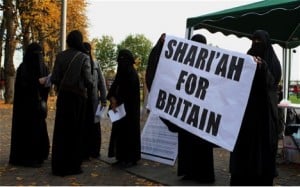This was written by Beverly M. Weber for Muslimah Media Watch.
“She became a victim of Islamophobia and xenophobia. She responded with dignity and exemplary civil courage.” – Plaque in memorial to Marwa el-Sherbini, located in the foyer of the Saxony Provincial Court
The murder of Marwa el-Sherbini in July 2009 sparked an intense, long-overdue discussion about Islamophobia and racism in Germany. These discussions have often included critical attention to the media’s role in creating negative images of Islam in Germany and Europe.
However, at the first anniversary of el-Sherbini’s death, these discussions continue to fall short of truly challenging the gendered constructions of Islam in Germany. The official memorial in honor of el-Sherbini acknowledges her civic courage, a concept that evokes a particular commitment to democratic participation and human rights in the German context. Yet the dominant discussions relegate el-Sherbini to a victim position, obscuring the important work done every day by Muslim activists to challenge the wide range of violence experienced by Muslim women in Germany today.
While El-Sherbini’s murder quickly gained international attention as an example of growing European Islamophobia, the national German press did not react to the case for nearly a week. The Central Council of Jews in Germany and the German Central Council of Muslims gave public statements condemning the crime, but Christian organizations and federal and local officials were slow to react publicly to the murder. By the time German officials and media did respond, el-Sherbini had been dubbed a “hijab martyr” in Egypt and Iran, and her death declared the first Islamophobic murder in Germany.
Media coverage a year after el-Sherbini’s death continues to portray her almost exclusively as a victim. The focus has been on an emerging acknowledgment of Islamophobia, el-Sherbini’s husband, the desire of el-Sherbini’s family to see the presiding judge and the intervening policeman prosecuted, newly implemented security measures in response to el-Sherbini’s murder, and the appropriation of el-Sherbini’s death for “anti-West” protests (often state sponsored) in Iran and Egypt (links in German):
- Frankfurter Allgemeine Zeitung, „Da sind auf einmal viele aufgewacht“
- Der Tagesspiegel, „Lehrstück in Rassismus“
- Das Bild, Marwas „Gedenkfeier, Ohne Uns“
- Neue Rheinische Zeitung, „Familien und Freunde klagen an“
- taz, die Tageszeitung, „Die Lehren aus Marwa el-Sherbinis Tod“
When the focus does shift to el-Sherbini herself, it is often to highlight her role as wife and mother, rather than the contribution she made by taking advantage of the German legal system to challenge Islamophobic speech. Presumptions made about Muslim women as victims who need to be spoken for and protected have contributed to this problem. El-Sherbini becomes either a “special case” because she was well-educated, spoke German well, and was well-integrated; or her education and action against racism disappears entirely from the coverage. But El-Sherbini, like other Muslim women in Germany today, was more than a victim of violence. She was also a courageous woman who drew on her everyday experiences in active democratic participation and in order to combat hate speech.
Important exceptions to victim narratives exist. Blogger and journalist Kübra Yücel, who recently co-founded Zahnräder, a network of young Muslim thinkers in Germany, has written columns in the daily taz expressing the impact of el-Sherbini’s actions on galvanizing networks of young Muslims to identify, articulate, and work against experiences of discrimination. Hilal Sezgin, also a taz journalist, points out that the media has partially failed in its role as mediator between state and public. She argues that part of this failure is caused by ignoring of certain questions (such as why Islamophobic and racist violence is on the rise) and prioritizing other issues (like headscarf debates and mastery of the German language).
Still, the victimhood discourse remains incredibly powerful. This partially explains the lack of feminist response to el-Sherbini’s murder. Many German feminists, including some prominent figures of Turkish heritage who insist on a rejection of Islam (such as Necla Kelek), have been quick to see themselves as the protector of “oppressed” Muslim women in the past. Why no response to a Muslim woman’s murder in a German courtroom, or to the media coverage that constantly falsely reported that Wiens had labeled el-Sherbini a “whore”? Why no response to the fact that el-Sherbini had been effectively denied access to employment because she wore hijab or to Wiens’ appeal to “women’s rights” in his threatening letter?
El-Sherbini was a self-assured woman claiming her rights under German law in the German court system. Her male family members were supportive, but marginal figures in her fight. This act of violence does not follow the typical pattern of media stories, films, and bestselling memoirs, in which a Muslim woman escapes the violence of her Muslim oppressor by rejecting Islam and wholeheartedly embracing liberal German democracy. Instead, she used German democratic structures to exercise her freedom of religion.
El-Sherbini also explicitly denied that she had been called a slut (an epithet news outlets stress she was called). She pressed charges to reject her positioning within German society as a terrorist and Islamist; while she sought to depoliticize the headscarf and de-gender her claims to human rights, the media continues to report that Wiens called her a slut. It’s an odd persistence, one that only makes sense if one acknowledges how intensely representations of Islam and Muslims in Germany are sexualized, if in contradictory ways. A counterpart exists in right-wing blogs that insist the media are ignoring how German women are called “sluts” by Muslims.
Certainly, the acknowledgment of racist and Islamophobic violence is crucial. In the course of a year, there have been fewer denials of that violence, and more honest attempts to acknowledge and question the relationship between German stereotypes of Islam and the violence enabled by them. But continuing to limit the public presence of Muslim women to roles only as victims of violence – even if this is a shift from domestic violence to racist violence – will continue to hinder access to democratic political participation, work, and education.











